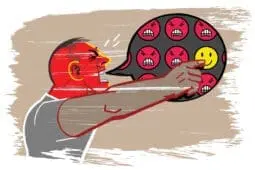Clinical Skills & Experience
When Therapy Is Going Nowhere
Escaping the “Groundhog Day” CycleWhen we’re spinning our wheels from one session to the next, the key to progress often lies in shifting the therapist-client relationship. Read more
Depathologizing the Borderline Client
Learning to Manage Our FearsInevitably, given their history of trauma, many borderline clients will trigger their therapists from time to time. But forgoing the urge to blame these... Read more
7 Questions to Ask When Therapy is Stuck
Mobilizing Creative ThinkingWhen therapy gets stuck, here are key questions therapists can ask themselves to broaden their vision and open clients to new possibilities. Read more
Psychotherapy’s Mark Twain
For Frank Pittman, Self-Seriousness Was the One Unpardonable SinNetworker movie critic and contributor Frank Pittman delighted in pointing out the follies, foibles, and excesses of the therapy world, especially anything he... Read more
Sympathy For The Devil
Mendota, a Youth-Treatment of Last ResortThe word psychopath distinguishes hard-bitten predators. Research shows a treatment center—run by shrinks, not wardens—has reduced new violent offenses by... Read more
Treating the Dissociative Child
The Road Back from the Ultimate Loss of SelfFew cases offer as eerie a therapeutic challenge as a suddenly noncommunicative child, lost in a dissociative shutdown. Read more
Motivating the Resistant Male Client
Terry Real On Why Leverage Is Key With MenYou’ve probably worked with men who’ve been dragged, kicking and screaming, into therapy by their partners. But how do you work with a client who doesn’t... Read more
Nothing Like Willy Loman?
A Classic Play Still Casts a Haunting SpellMore than 60 years after its Broadway debut, a classic play continues to cast a haunting spell. Read more
Do childhood trauma and a chaotic family environment cause adult borderline personality disorder (BPD)? Common clinical wisdom says yes, but new results are... Read more
Psychologist Philip Zimbardo knows a thing or two about tough guys. In 1971, his notorious Stanford prison experiment, originally planned for two weeks, had to... Read more
One Brick at a Time
Therapy is More Craft Than Art or ScienceIn this era of medical necessity and evidence-based therapies, it’s easy to lose sight of a basic truth. We heal not through prescriptions and procedures... Read more
How Conversation Sparks Therapeutic Change
The Search for the Unspoken SelfWhen we trust in ourselves to follow the signals of life that the patient emits in seemingly casual conversation, we increase chances of stepping outside the... Read more
Why Teens Hate Therapy
Mistakes Therapists Should AvoidIt’s probably fair to say that most teens loathe the very idea of therapy. Yet, with confused and troubled adolescents needing our help more than ever, the... Read more
How to Heal the Angry Brain
Mad MenMen with anger problems are generally highly reluctant clients who come to our offices only because they’ve gotten “the ultimatum” from their wives... Read more
Isle of Dreams
Searching for a lost self in the Ould SodSometimes the places we long to visit speak to needs that go much deeper than our appetite for exotic sights. Read more
Editor's Note: July/August 2012
Ethics and BoundariesThe hallmark of the therapeutic encounter is that the therapist is an expert, trained in a particular skill-set to conduct a rather odd, rarified conversation... Read more
Yesterday’s Ethics Vs. Today’s Realities
Boundaries in an Age of InformalityAs the status of therapist has shifted from an oversized figure with Svengali-like powers to an overworked and underpaid service provider at the mercy of the... Read more
Therapeutic Ethics In The Digital Age
When the Whole World is WatchingThe revolution in communication technology has created a new set of ethical dilemmas, which are invading our sessions, whether we know it or not. Read more
Therapist Self-Disclosure
Think Before You Get PersonalThe ways we disclose, read cues from our clients, and dialogue about what’s been divulged are the keys to whether therapist self-disclosure helps clients’... Read more
Psychotherapy and The Law
Two Practical PerspectivesA therapist–lawyer on what most often gets clinicians in trouble with the law and everything you need to know about the duty to report, to warn—and more. Read more
The Art of Hanging-In There
A Hospice Social Worker’s Take on Inside CurveballsWhen something is coming at you that may cause pain or self-doubt, it’s natural to want to duck. Read more
The Anatomy of Self-Hatred
Learning to Love Our Loathed "Selves"With stalemated cases in which the task of self-acceptance feels impossible, the therapist needs to offer more than compassion and encouragement. Read more
What If Your Mobile Device Went Missing?
The Importance of Tracking our TechnologiesEver consider what would happen if your portable device—chock full of information about your clients—went missing? Read more
Irvin Yalom on Psychotherapy as Craft
Looking Back to Move ForwardIn an age when all eyes seem constantly riveted on the Next Big Thing, celebrated therapist-novelist Irvin Yalom takes a different approach. Read more
Mozart Redux
Not All Families are Related by BloodNot all families are related by blood. Read more
Using Men’s Groups to Enhance Couples Therapy
Men Helping MenFor men who still consider entering couples therapy a stroll into a lion’s den of shame, humiliation and failure, men’s groups can be both a crucial source... Read more
Editor's Note: May/June 2012
Our Emotions: Unruly, Unnerving, InvaluableThis issue maps out not only what the latest science tells us about how emotion works, but also how therapists can more fully acknowledge within themselves the... Read more
Connecting with the Shut-down Client
Helping A Combat Vet Face His VulnerabilityResonating with clients’ inner experience is key to working effectively with emotion in therapy. With traumatized and shutdown clients, however, it is easy... Read more
Psychotherapy's Greatest Debates
Assessing the State of the Art 2012The State of the Art, the Networker’s first-ever virtual conference, offered an opportunity for leaders in our field who disagree to debate each other... Read more
Beyond Clinical Correctness
Unearthing the logic of the client’s solutionAn understanding of the unconventional ways people demonstrate resilience is important in helping us avoid pathologizing clients and stop believing there’s... Read more























